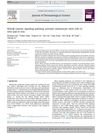 53 citations,
November 2006 in “Journal of Endocrinology”
53 citations,
November 2006 in “Journal of Endocrinology” Prolactin slows down hair growth in mice.
 52 citations,
May 2015 in “PLOS Genetics”
52 citations,
May 2015 in “PLOS Genetics” miR-22, a type of microRNA, controls hair growth and its overproduction can cause hair loss, while its absence can speed up hair growth.
 52 citations,
November 2013 in “European Journal of Pharmaceutical Sciences”
52 citations,
November 2013 in “European Journal of Pharmaceutical Sciences” Chitosan-decorated polymersomes improve finasteride delivery for hair loss treatment.
 52 citations,
January 1999 in “Journal of Small Animal Practice”
52 citations,
January 1999 in “Journal of Small Animal Practice” Removing a cat's pancreatic cancer can temporarily reverse hair loss caused by the disease.
52 citations,
May 1997 in “Journal of Biological Chemistry” High ornithine decarboxylase levels may lead to hair loss and cancer by increasing CK2 activity in the nucleus.
 51 citations,
February 2009 in “Journal of dermatological science”
51 citations,
February 2009 in “Journal of dermatological science” Pitx2 helps outer root sheath cells differentiate but can't start hair growth on its own.
50 citations,
July 1996 in “Cell” Chromosomal changes, including those in the WRN gene and rDNA, may significantly contribute to aging.
 49 citations,
October 2009 in “Cancer research”
49 citations,
October 2009 in “Cancer research” Disrupting Stat3 in hair follicle stem cells greatly reduces skin tumor formation.
 49 citations,
August 2007 in “Dermatologic surgery”
49 citations,
August 2007 in “Dermatologic surgery” New treatments for acne scars are safer and more effective because we understand the causes better.
 48 citations,
January 2011 in “International journal of trichology”
48 citations,
January 2011 in “International journal of trichology” Intralesional triamcinolone acetonide is the most effective treatment for localized alopecia areata.
48 citations,
March 2010 in “PloS one” C/EBPalpha and C/EBPbeta are crucial for normal skin and oil gland cell development in adult mice.
47 citations,
September 2012 in “Human molecular genetics online/Human molecular genetics” Folliculin deficiency causes problems with cell division and positioning due to disrupted RhoA signaling and interaction with p0071.
 47 citations,
April 2012 in “The Plant Journal”
47 citations,
April 2012 in “The Plant Journal” Phosphorylation of certain parts of the PIN3 protein is crucial for its role in plant root growth and response to gravity.
47 citations,
September 1995 in “British Journal of Dermatology” Diphencyprone therapy for hair loss can cause vitiligo.
 46 citations,
March 2019 in “Journal of Pineal Research”
46 citations,
March 2019 in “Journal of Pineal Research” Melatonin improves cashmere goat hair growth and quality by increasing antioxidants and reducing cell death.
45 citations,
August 2018 in “Haematologica” Macrophage iron release is crucial for hair growth and wound healing.
 45 citations,
May 2018 in “Stem Cell Research & Therapy”
45 citations,
May 2018 in “Stem Cell Research & Therapy” Using patients' own fat-derived cells to treat alopecia areata significantly improved hair growth and was safe.
 45 citations,
April 2016 in “Journal of Dermatological Science”
45 citations,
April 2016 in “Journal of Dermatological Science” The Wnt/β-catenin pathway can activate melanocyte stem cells and may help regenerate hair follicles.
44 citations,
June 2017 in “The EMBO Journal” LPA3 signaling in the uterus is crucial for placental formation and fetal development.
44 citations,
June 1967 in “The journal of nutrition/The Journal of nutrition” Lack of essential fatty acids in diet causes reproductive issues and poor health in male rabbits.
 43 citations,
December 2008 in “Molecular biology of the cell”
43 citations,
December 2008 in “Molecular biology of the cell” Disrupting Smad4 in mouse skin causes early hair follicle stem cell activity that leads to their eventual depletion.
42 citations,
June 2019 in “Aging” 3,4,5-tri-O-caffeoylquinic acid promotes hair growth by activating the β-catenin pathway.
 41 citations,
April 2016 in “Journal of experimental botany”
41 citations,
April 2016 in “Journal of experimental botany” RACB in barley is crucial for cell polarity and nucleus positioning, aiding fungal infection.
 41 citations,
September 2014 in “Journal of Pharmacy and Pharmacology”
41 citations,
September 2014 in “Journal of Pharmacy and Pharmacology” Melatonin may help treat PCOS symptoms in rats.
 39 citations,
December 2008 in “Clinics in Dermatology”
39 citations,
December 2008 in “Clinics in Dermatology” Dermoscopy has improved skin cancer diagnosis and has expanding applications in dermatology, but requires staying updated with new research and techniques.
 38 citations,
June 2018 in “Plant & cell physiology/Plant and cell physiology”
38 citations,
June 2018 in “Plant & cell physiology/Plant and cell physiology” Changing the amount of PLC5 in Arabidopsis affects root growth and drought resistance, with less PLC5 slowing root growth and more PLC5 improving drought tolerance but hindering root hair growth.
 37 citations,
September 2018 in “Psychoneuroendocrinology”
37 citations,
September 2018 in “Psychoneuroendocrinology” Finasteride treatment in male rats causes long-lasting effects on depression-like behavior, brain cell growth, inflammation, and gut bacteria composition.
37 citations,
August 2011 in “Journal of Bone and Mineral Research” A girl had rickets due to a gene mutation affecting vitamin D response.
 36 citations,
September 2018 in “American Journal of Clinical Dermatology”
36 citations,
September 2018 in “American Journal of Clinical Dermatology” Combination of 0.25% finasteride and 3% minoxidil works better than just 3% minoxidil for increasing hair thickness in women.
 36 citations,
April 2018 in “Journal of Investigative Dermatology”
36 citations,
April 2018 in “Journal of Investigative Dermatology” Macrophages help hair growth after injury through CX3CR1 and TGF-β1.




















